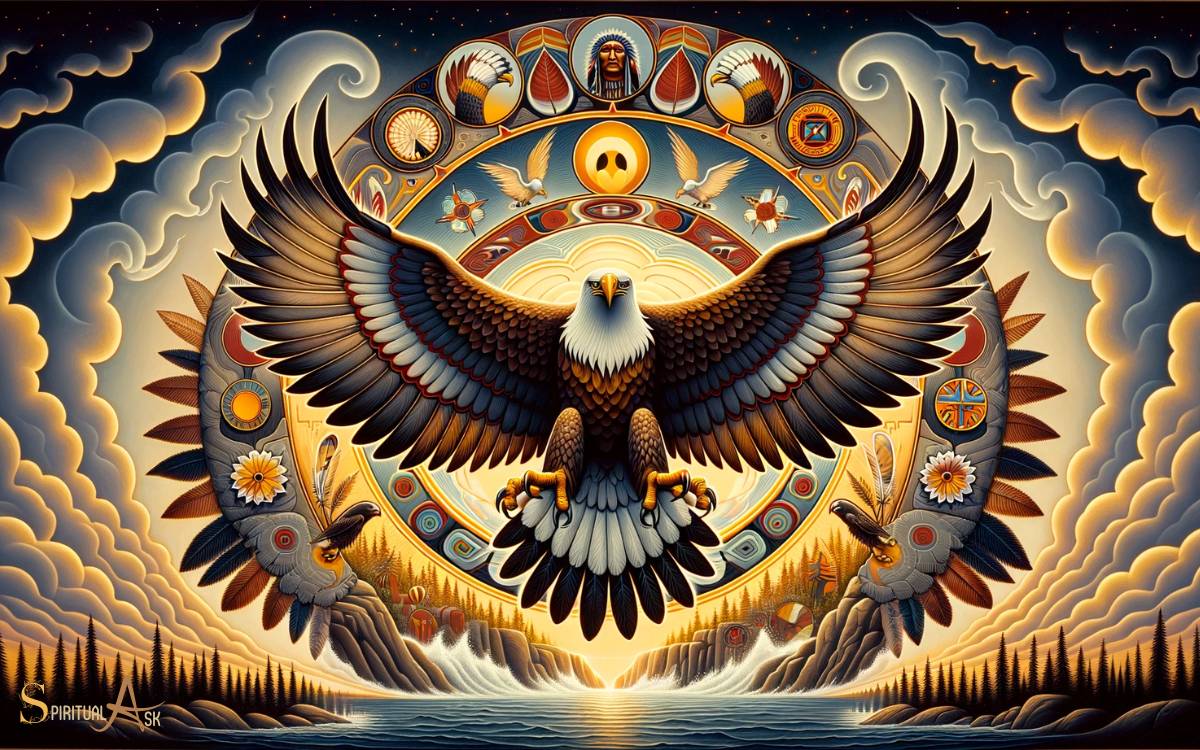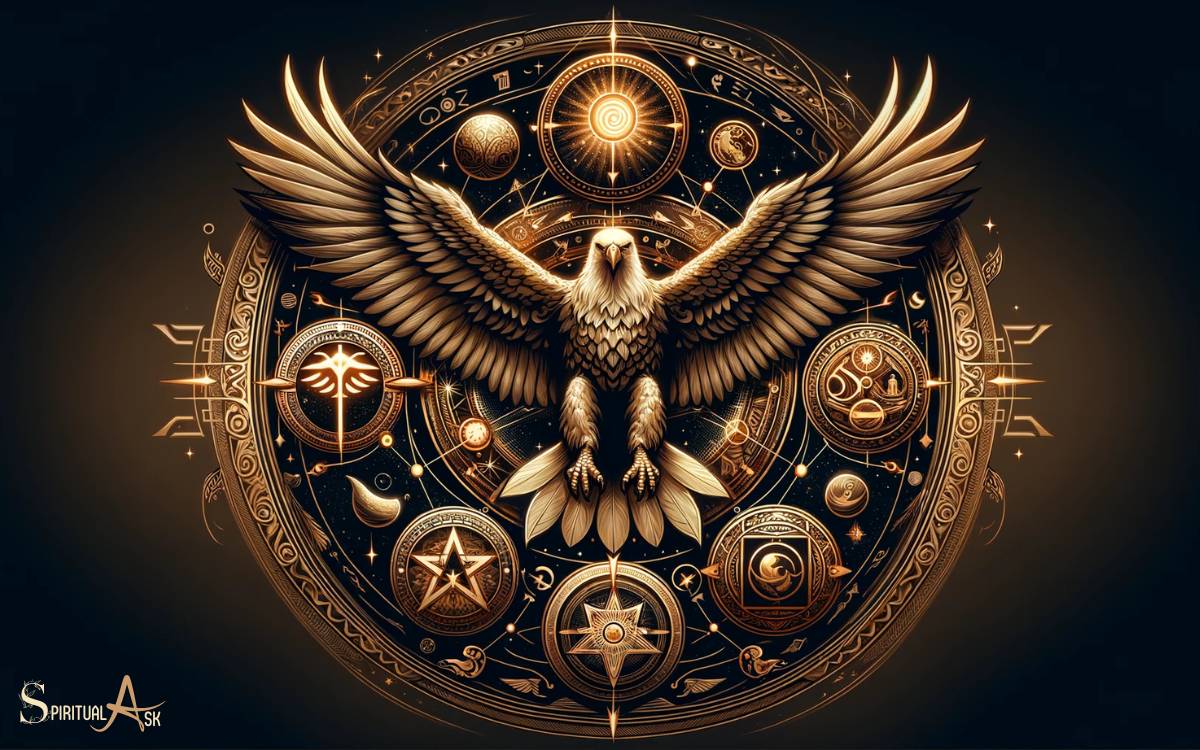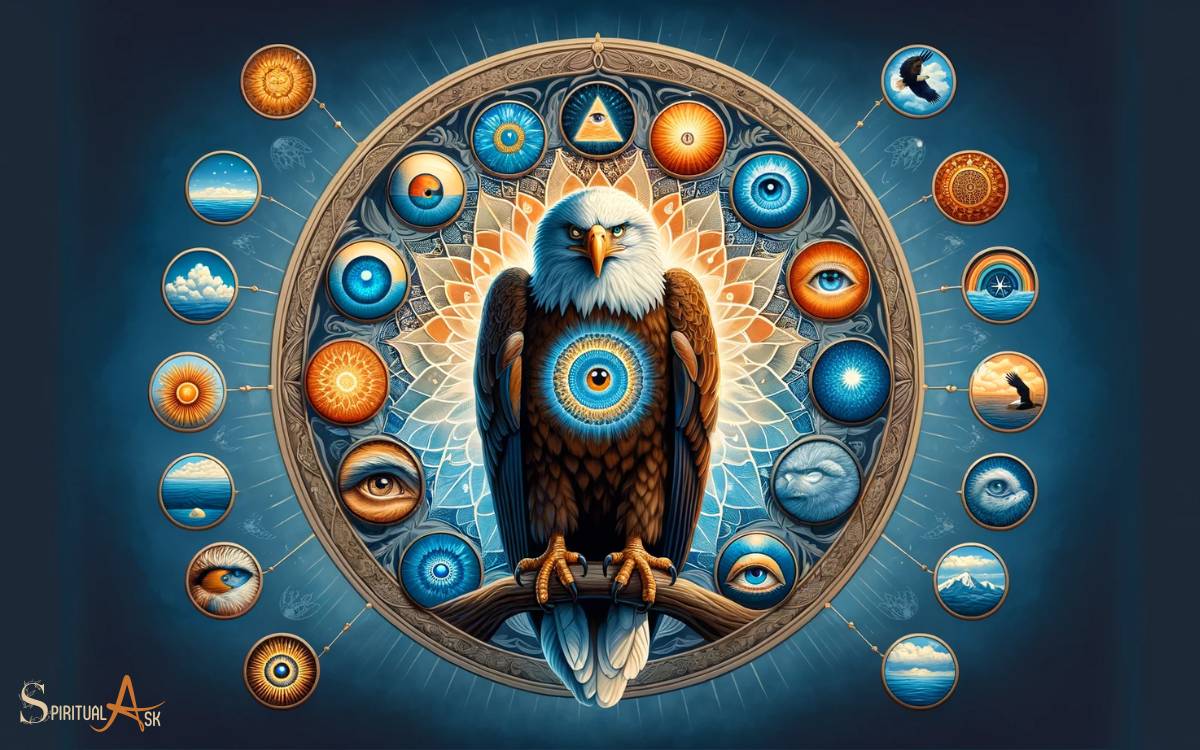What Does an Eagle Symbolize Spiritually? Freedom!
The eagle is a powerful spiritual symbol that signifies strength, freedom, and divine connection. It is revered in various cultural traditions for its awe-inspiring presence and the attributes it represents.
In spirituality, the eagle embodies wisdom, courage, and the ability to renew oneself. It is often seen as a messenger between the earthly and spiritual planes, indicating a deep sense of vision and transcendence.
The spiritual symbolism of the eagle is rich and varied:
Embrace the eagle’s spirit to soar to new heights of spiritual understanding and personal growth.

Key Takeaway
5 Cultures Significance of Eagles Spiritually
| Culture/Tradition | Symbolic Meaning | Aspect of Eagle Emphasized |
|---|---|---|
| Native American | Divine messenger, honor | Spiritual Connection |
| Biblical Texts | Strength, renewal | Resilience |
| Ancient Mythology | Connection to the heavens | Vision |
| Eastern Traditions | Keen sight, celestial power | Wisdom |
| Shamanism | Bridge between realms | Spiritual Guidance |
Eagle Symbolism in Native American Culture
As an integral part of my spiritual beliefs, the eagle holds significant symbolism in Native American culture.

The eagle is revered as a symbol of strength, wisdom, and courage. It is seen as a messenger between the physical and spiritual worlds, carrying prayers and visions to the Creator.
In Native American folklore, the eagle is also associated with the embodiment of freedom and the connection to the Great Spirit.
The bird’s ability to soar high in the sky is a representation of spiritual growth and the pursuit of truth.
Eagles are often depicted in Native American art, dances, and ceremonies, emphasizing their esteemed status in tribal traditions.
Biblical Significance of Eagles
Continuing from the Native American symbolism, in my spiritual beliefs, the eagle also holds significant biblical significance as a symbol of strength and divine protection.

In the Bible, the eagle is referenced as a powerful and majestic bird that soars high above the earth, representing God’s strength and supremacy. In the book of Isaiah, it is written that “those who hope in the Lord will renew their strength.
They will soar on wings like eagles; they will run and not grow weary, they will walk and not be faint.”
This verse portrays the eagle as a symbol of spiritual renewal and endurance through the strength provided by God.
Additionally, the eagle is mentioned in the book of Psalms as a representation of God’s protective care over His people.
The biblical significance of eagles aligns with the idea of strength, protection, and spiritual renewal.
Eagle Symbolism in Ancient Mythology
I’ve always been fascinated by the role eagles play in ancient mythology. They often serve as divine messengers, carrying messages between the earthly realm and the heavens.

Additionally, eagles are frequently seen as symbols of power and strength in various ancient cultures.
Eagle as Divine Messenger
In my research, I’ve come across the significance of the eagle as a divine messenger in ancient mythology.
Across various cultures, the eagle has been revered as a symbol of divine communication and spiritual guidance.
- In Greek mythology, the eagle was associated with Zeus, the king of the gods, serving as his messenger and symbolizing strength and wisdom.
- Similarly, in Norse mythology, the eagle was believed to be a messenger of the gods, carrying knowledge from the divine realms to the mortal world.
- Native American cultures also view the eagle as a sacred messenger, representing connection to the spirit world and carrying prayers to the Creator.
The consistent portrayal of the eagle as a divine messenger in ancient mythology signifies its universal symbolism of spiritual insight, foresight, and divine communication.
Eagle as Symbol of Power
Having explored the eagle’s role as a divine messenger in ancient mythology, I now delve into its representation as a symbol of power in various cultural narratives.
In many ancient mythologies and cultures, the eagle is revered as a powerful symbol, embodying strength, leadership, and authority.
Here are three ways the eagle symbolizes power in ancient mythology:
- Leadership: The eagle is often depicted as a creature that possesses keen vision and soars high above, symbolizing the ability to see the bigger picture and lead with clarity.
- Dominance: Its predatory nature and ability to conquer prey from great heights symbolize dominance and control.
- Connection to the Divine: Many cultures believed that the eagle was a messenger of the gods, bestowing upon it a divine authority.
This representation of the eagle as a symbol of power sets the stage for understanding its significance in ancient mythology.
Eagle Symbolism in Eastern Traditions
Within Eastern traditions, my research has revealed that the eagle is often associated with strength, freedom, and divine protection.
In Eastern cultures, the eagle holds deep spiritual significance and is revered for its majestic qualities.

Here is a table that highlights the symbolism of the eagle in some Eastern traditions:
| Tradition | Eagle Symbolism |
|---|---|
| Hinduism | Represents Garuda, the divine eagle and the king of birds |
| Buddhism | Symbolizes the peaceful and wrathful deities |
| Taoism | Signifies strength, courage, and the unity of heaven and earth |
| Shintoism | Associated with Amaterasu, the sun goddess |
These traditions showcase the diverse spiritual meanings attributed to the eagle in Eastern cultures, emphasizing its significance as a symbol of power, protection, and transcendence.
The Power of Eagles in Shamanism
As I explore the power of eagles in shamanism, it’s fascinating to consider their role as spiritual guides and symbols of shamanic healing.

From ancient traditions to modern practices, eagles hold significant spiritual significance in shamanism, often playing a crucial part in guiding individuals through their spiritual journeys and facilitating healing processes.
Understanding the deep connection between eagles and shamanism sheds light on the profound impact these majestic creatures have had on spiritual practices throughout history.
Eagle as Spiritual Guide
Eagles have been my spiritual guides for many years, and their presence in shamanism speaks to their immense power and significance in guiding us on our spiritual journeys.
In shamanic traditions, eagles are revered for their ability to soar to great heights, offering us a perspective beyond the physical world.
As spiritual guides, eagles teach us valuable lessons:
- Vision: Eagles are known for their keen eyesight, symbolizing the clarity and focus needed to see beyond surface-level appearances and into the heart of matters.
- Courage: Their fearless nature encourages us to face our fears and take bold leaps of faith on our spiritual paths.
- Connection to the Divine: Eagles are seen as messengers between the earthly realm and the spiritual realm, reminding us of our connection to something greater than ourselves.
Embracing the wisdom of eagles can enrich our spiritual experiences, guiding us towards greater understanding and growth.
Shamanic Healing With Eagles
In my experience, I have witnessed the transformative power of shamanic healing with eagles as they guide individuals through spiritual journeys.
In shamanism, eagles are revered for their ability to soar to great heights and gain a broader perspective, which is symbolic of the shaman’s role in facilitating healing and guiding spiritual growth.
During shamanic ceremonies, the eagle is called upon to provide protection, strength, and clarity to those seeking healing.
The eagle’s keen vision and connection to the heavens are believed to help shamans access higher realms and bring back wisdom and insight for the individual’s well-being.
Through the use of eagle feathers, chants, and rituals, the shaman harnesses the powerful, transformative energy of the eagle to facilitate healing and restore balance to the mind, body, and spirit.
Eagles as Symbols of Freedom and Strength

Feeling a deep connection with the eagle’s symbolism of freedom and strength resonates with my spiritual beliefs. Feeling a deep connection with the eagle’s symbolism of freedom and strength resonates with my spiritual beliefs. However, I’ve also come to appreciate the humbler lessons found in chicken symbolism and spiritual courage. While the eagle soars high, the chicken reminds us of the grounded bravery it takes to protect, nurture, and face challenges head-on, teaching that courage isn’t always grand—it’s often found in everyday acts of resilience.
The eagle, to me, represents the embodiment of spiritual and emotional liberation, as well as the unwavering power that comes from within.
In my understanding, eagles symbolize:
- Freedom: Eagles soar high in the sky, free from the constraints of the earth, representing the freedom to rise above challenges and limitations.
- Strength: With their sharp vision and powerful wings, eagles embody inner strength, resilience, and the ability to conquer adversity.
- Courage: Eagles fearlessly navigate storms and turbulent winds, teaching us to confront our fears and embrace change with bravery.
Understanding the eagle’s symbolism of freedom and strength inspires me to cultivate these qualities within myself, fostering a deeper spiritual connection to the world around me.
The Spiritual Lessons From Eagle Behavior
From my perspective, the spiritual lessons from eagle behavior offer profound insights into resilience and adaptability. Observing eagles in their natural habitat, I’ve learned that they are incredibly adaptable creatures.

They can soar to great heights and also swiftly dive down to catch their prey. This behavior teaches us about the importance of being flexible and agile in our own lives, especially when facing challenges.
Additionally, eagles exhibit remarkable resilience. They endure harsh weather conditions and persevere in their hunt for food.
This resilience serves as a powerful reminder that we, too, can weather the storms of life and emerge even stronger.
By embodying these traits of adaptability and resilience, we can navigate life’s obstacles with grace and determination, just like the majestic eagle.
Conclusion
The eagle symbolizes spiritual strength and freedom across various cultures and traditions. Just like the eagle soars high above the earth, we too can rise above our challenges and adversities.
The image of the eagle teaches us to embrace our inner power and have the courage to face life’s obstacles with grace and dignity. Let the eagle inspire us to reach new heights and overcome any obstacles in our path.






